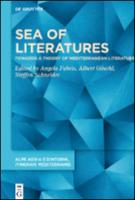Sea of Literatures
Towards a Theory of Mediterranean Literature
| dc.contributor.editor | Fabris, Angela | |
| dc.contributor.editor | Göschl, Albert | |
| dc.contributor.editor | Schneider, Steffen | |
| dc.date.accessioned | 2024-02-23T13:30:00Z | |
| dc.date.available | 2024-02-23T13:30:00Z | |
| dc.date.issued | 2023 | |
| dc.identifier | ONIX_20240223_9783110775136_19 | |
| dc.identifier | OCN: 1414456562 | |
| dc.identifier.uri | https://library.oapen.org/handle/20.500.12657/87818 | |
| dc.description.abstract | Mediterranean studies flourish in literary and cultural studies, but concepts of the Mediterranean and the theories and methods they use are very disparate. This is because the Mediterranean is not a simple geographical or historical unity, but a multiplicity, a network of highly interconnected elements, each of which is different and individual. Talking about Mediterranean literature raises the question of whether the connectivity of Mediterranean literature can or should be limited in some way by constructing an inside and an outside of the Mediterranean. What kind of connectivity and fragmentation do literary texts produce, how do they build and interrupt references (to the real, to fictional forms of representation, to history, but also to other texts and discourses), how do they create and deny communication, and how do they engage with and reflect literary and non-literary concepts of the Mediterranean? These and other questions are considered and discussed in the over twenty contributions gathered in this volume. ; Mediterranean studies flourish in literary and cultural studies, but concepts of the Mediterranean and the theories and methods they use are very disparate. This is because the Mediterranean is not a simple geographical or historical unity, but a multiplicity, a network of highly interconnected elements, each of which is different and individual. Talking about Mediterranean literature raises the question of whether the connectivity of Mediterranean literature can or should be limited in some way by constructing an inside and an outside of the Mediterranean. What kind of connectivity and fragmentation do literary texts produce, how do they build and interrupt references (to the real, to fictional forms of representation, to history, but also to other texts and discourses), how do they create and deny communication, and how do they engage with and reflect literary and non-literary concepts of the Mediterranean? These and other questions are considered and discussed in the over twenty contributions gathered in this volume. | |
| dc.language | English | |
| dc.relation.ispartofseries | Alpe Adria e dintorni, itinerari mediterranei | |
| dc.subject.classification | thema EDItEUR::D Biography, Literature and Literary studies::D Biography, Literature and Literary studies::DS Literature: history and criticism | en_US |
| dc.subject.classification | thema EDItEUR::D Biography, Literature and Literary studies::DS Literature: history and criticism::DSB Literary studies: general | en_US |
| dc.subject.classification | thema EDItEUR::D Biography, Literature and Literary studies::DS Literature: history and criticism::DSB Literary studies: general::DSBH Literary studies: c 1900 to c 2000 | en_US |
| dc.subject.classification | thema EDItEUR::J Society and Social Sciences::JB Society and culture: general::JBC Cultural and media studies::JBCC Cultural studies | en_US |
| dc.subject.other | Mittelmeer-Studien | |
| dc.subject.other | Identität | |
| dc.subject.other | Vergleichende Literaturwissenschaft | |
| dc.subject.other | Kulturgeschichte | |
| dc.subject.other | Mediterranean Studies | |
| dc.subject.other | Identity | |
| dc.subject.other | Comparative Literary Studies | |
| dc.subject.other | Cultural History | |
| dc.title | Sea of Literatures | |
| dc.title.alternative | Towards a Theory of Mediterranean Literature | |
| dc.type | book | |
| oapen.identifier.doi | 10.1515/9783110775136 | |
| oapen.relation.isPublishedBy | 2b386f62-fc18-4108-bcf1-ade3ed4cf2f3 | |
| oapen.relation.isbn | 9783110775136 | |
| oapen.relation.isbn | 9783110757637 | |
| oapen.relation.isbn | 9783110775211 | |
| oapen.imprint | De Gruyter | |
| oapen.series.number | 3 | |
| oapen.pages | 420 | |
| oapen.place.publication | Berlin/Boston |

